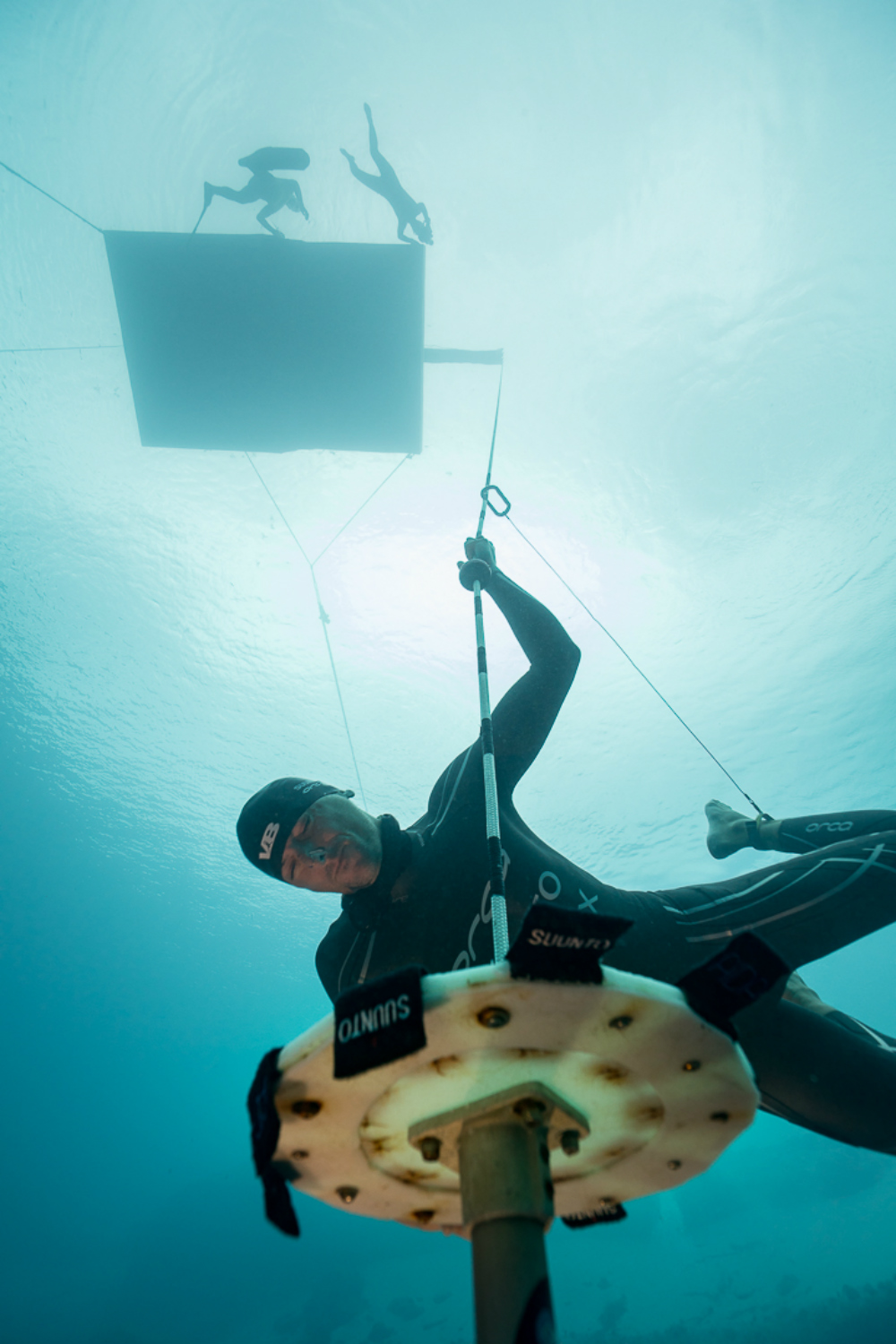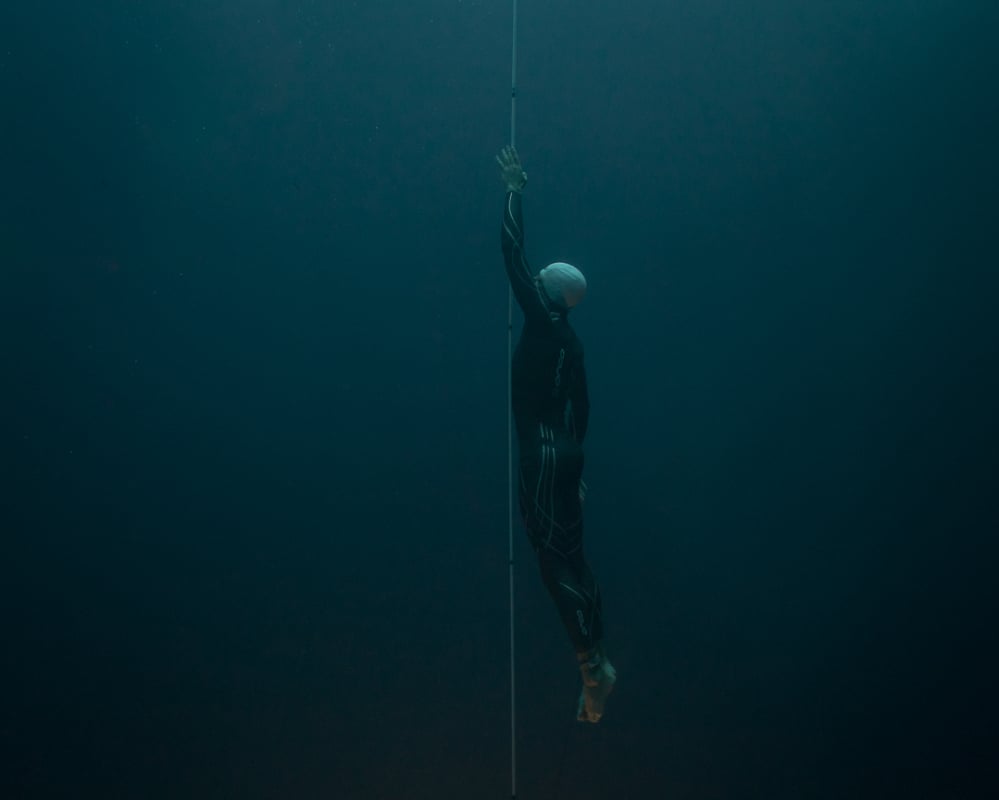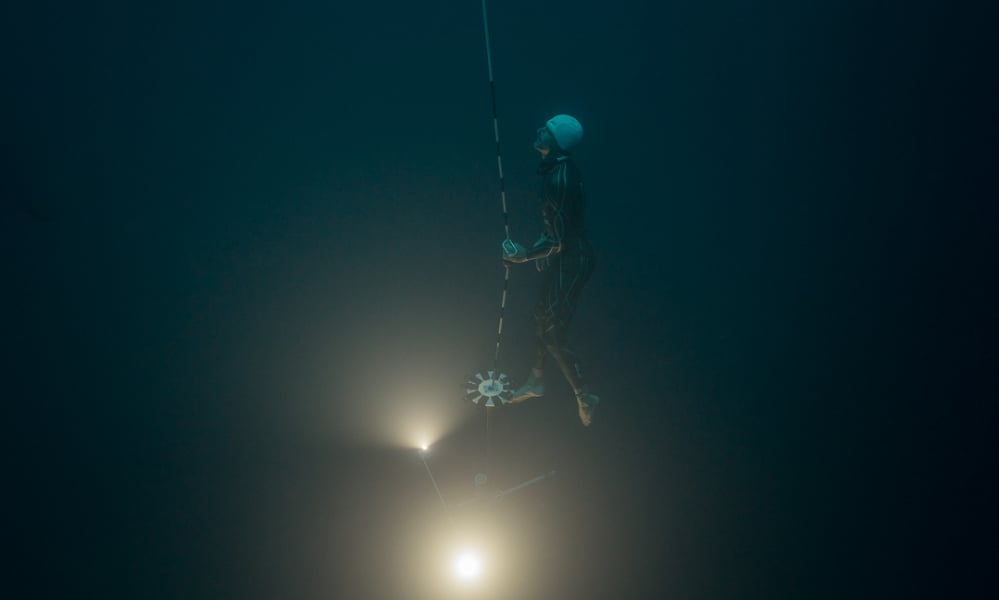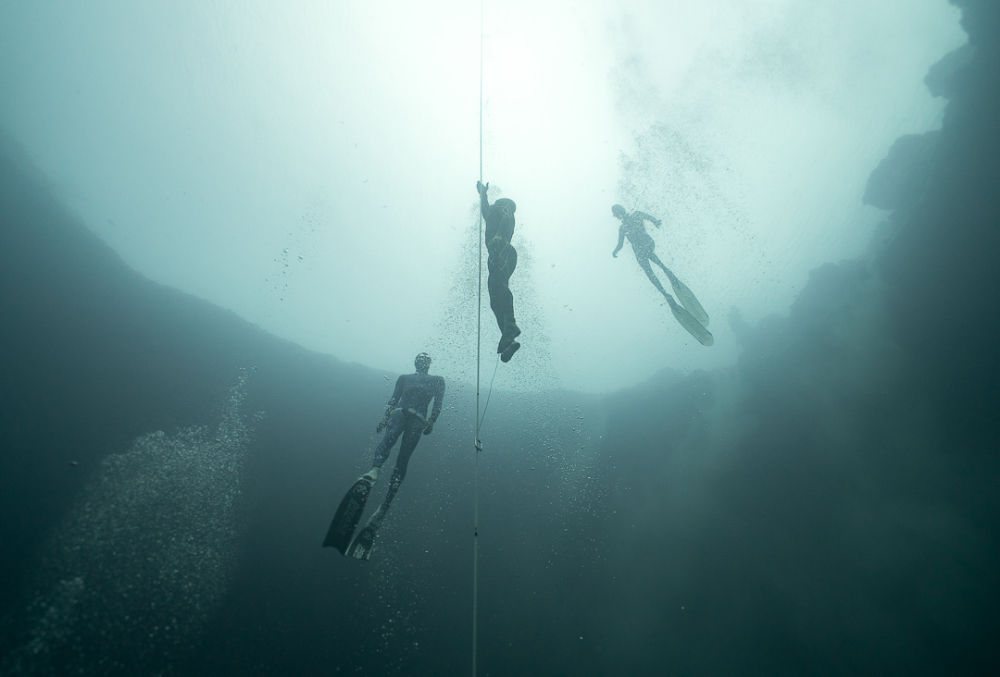
William takes the 126m depth tag on his world record attempt dive. © Johnathan Sunnex
COVID-19 kept Suunto ambassador William Trubridge isolated on Long Island in the Bahamas since March 2020 allowing him to focus exclusively on training with few distractions. After several months he started to see the benefits and his performances in many areas were the best of his career so far.
Although he is disappointed he didn't achieve a new world record, William is undeterred in his drive to continuing pushing and exploring the ultimate human limits for freediving.
Willam, what was the goal for this event?
My goal was to try and break the world record in Free Immersion, FIM (in which the athlete pulls on the rope to descend and ascend), currently at 125 m world record set in 2018 by Alexey Molchanov. I held the 124 m world record in FIM previously since 2011, but I thought it was about time I got it back!
Why now?
I came to the Bahamas in March and somewhat fortuitously have been trapped here safe in the remoteness of the island ever since, and happily, my family was able to join me in the summer from Japan.
COVID has been tough for everyone but it has meant that I have been able to focus on my training maybe more than I would have normally, having not had any courses or competitions scheduled. This has facilitated the best kind of training with no competitions looming, I've been able to maintain focus on the goal. I really felt like I was in the right place to attempt the record.
It's been four years since your last attempt, why the long pause?
Firstly, I think it is becoming more and more difficult to break world records. As with any sport, it’s not something that can continue indefinitely. There is always going to be a plateauing effect as we approach the human limits, wherever they are, and this is happening now in freediving as it has in other sports. In recent years there hasn't been much of an increase in FIM depths, and any of the disciplines of freediving as there were prior.
Also, in the last four years, I have been involved in a lot of other projects, and starting a family has been the biggest. That has involved not just a shift in day-to-day life and rhythms, but your whole perspective, and it is one of the most difficult things we go through but I have learned to take it in my stride. Now I am settled into family life, my training has been going well and my performances are the best they have ever been. I am ready to get back into it.

William ascending on the line. © Johnathan Sunnex
How are you feeling training wise?
I have done many of the deepest dives I have ever done in this discipline in recent months and also in other parameters of base training to do with breath-hold times, static apnea, and exhale static apnea (breath-hold with empty lungs) reaching the longest times I've ever done in these difficult exercises.
In terms of breath-hold and depth adaptation, I am in the best condition of my life. A world record attempt is a whole other monster so although all the signs are good, you have to deal with the mental game and the weather conditions, for which relaxing in the water with a thin wetsuit can sometimes be problematic.
What's changed in your training since your last world record?
Quite a lot has changed in my training since the last record. I am always in a constant state of development and evolution as I research and experiment with myself. I have focused on my weaker links, which are mainly breath-hold, but if any of the factors slip then you won't be able to dive deep.
Is technology or science helping with the evolution of the sport?
There is always a benefit from an increased understanding of the physiology and science of the sport.
Especially in my 17-year career, there have been huge changes. When I first started training I was feeling around in the dark a bit but now I have a more definitive, but not a complete idea. I'm sure that in the next ten years athletes will be far better equipped with an understanding of what's happening in their bodies and how to maximize that in their training. What happens in your body when freediving and what you require mentally and physically is unlike any other sport. From the dive reflex, the compression, the heart slowing, to the high acidic and lactic loads we are still discovering more efficient ways to train to maximize performance in those parameters.
Has your outlook or mindset changed in any way?
Yes, it has changed. Becoming a father has been the biggest shift. It changes your attitude toward risk, and your risk tolerance decreases. In freediving though, it has not changed so much, but in other areas like driving, and driving scooters in Indonesia in particular, it has definitely changed!
A lot of my training has been about identifying risks and accommodating them with enhanced safety mechanisms.

The turning point 126m down, with 126m more to reach the surface! Johnathan Sunnex ©
You turned 40 this year (congrats!); how does getting older affect you in this sport? And is there more risk?
It is hard to say what the effects of age on the sport are. We've seen athletes perform well into their 50s and 60s. Natalia Molcahov, before her untimely disappearance, was smashing women's world records in her 50s. It's definitely a sport where we benefit from the maturity of age and the slowing of the metabolism, but the risk lies in susceptibilities we are not aware of that increase with age, that I have been working on identifying. We need to be aware of this and prevent risks before they occur if possible.
How has the pandemic helped or hindered your preparation?
The pandemic has had a huge effect, mostly negative but some positive. I've been able to focus on training but mostly it has just been me and one other person here. However, now the record attempt team has increased and it is nice to connect and have more of a support group for training.
The biggest impact has been the uncertainty. As an athlete, with sports like freediving, you are aware of the fact that it is an expendable job, not as important socially as a Doctor and a teacher. More of a luxury in society as the arts, the sports, they are the first to go in a major fallout or crash.
Now having a family has been the main impact on me but luckily I have been able to train consistently through this period with the hope to capitalize on that.
What drives you to continue with this? Surely, you've found the human limits for apnea now?
No, we have not found the human limits, we never will. it is just a matter of stretching out the grey area of possibility and finding an approximation. We know we can go at least one or two more meters, maybe ten, twenty, who knows! It becomes more and more improbable and our job as athletes is to stretch into that zone and redefine human limits as much as we can.
How was the world record attempt dive?
Ah, 2020. Did anyone other than Jeff Bezos escape its infamy? I was hoping to end the year on a good note, by attempting a world record in Free Immersion. In training, I logged a dive to 126 m that was not just a personal best and one meter deeper than the current world record, but also one of the strongest and most enjoyable dives in this discipline of my career. Based on the strength of this dive, I announced a world record attempt for December 2020.
Then disaster hit.
The worst incident of my life. A deep underwater blackout in training was caused not by low oxygen but most likely by toxic levels of carbon dioxide. It was something that has to date been a hidden risk, lurking latent in the deepest depths of competitive freediving. I was under the water for almost 7 minutes and revived by the impeccable action of my safety team as well as a lot of luck.

William surrounded by safety divers, who in training revived him after disaster hit while deep underwater. © Johnathan Sunnex
What made you try again?
Afterward, I wasn’t even thinking about a world record. I took two weeks off and enjoyed being a father to my 20-month-old daughter. But when I tentatively returned to breath-hold and the water I found miraculously that my form had remained, or even improved. Mentally there didn’t seem to be any scars either. After consulting with my team and doctor I decided to press on with the attempts.
I built back through the depths again to the point where I was diving close to the record depth. Then 2020 threw me some more challenges: bad weather, a problem with my ear and jaw, a commercial shoot with dates that had to change and overlap with the record attempts… I was still diving strong, but not with the consistency I need in the build-up for an attempt.
When the window came for attempting the record I spent the first few days finding my feet again with dives to 118 m and 121 m. Then I decided to attempt the record on the 11th December 2020.
After such impressive results in training, what happened on your world record first attempt?
The day arrived, and so had a cold front, with low grey skies and temperatures plummeting. The wetsuit I’d been training in wasn’t enough, and after testing the waters I called the dive off, knowing that shivering would cause me to waste precious oxygen before the dive even began.
The next day was perfect. The sun makes all the difference when we’re lying stretched out on the surface of the water preparing in the final minutes before a dive. It was the right day for a record attempt, and I felt good, perhaps too good.
My time was slower, more relaxed on the way up, and this slight adjustment might have affected my efficiency negatively.
After retrieving the tag from 126 m and returning to the surface, I took two breaths then fell back momentarily in a brief surface blackout. It ended as quickly as it had begun, but the damage was done and the dive was disqualified.
How did this affect your mindset for the next attempt?
I needed to take a day off after the blackout, which meant I was left with one last day, the 14th. The cold had returned just a little, and this combined with some minor mistakes in the descent snowballed into an increasingly negative mental and physical state, until soon after the turn I felt like the dive was almost certain to end badly.
I tugged sharply three times on the rope to signal my surface crew, who released the counter ballast, pulling the rope up and giving me a free ride back to the surface.
Being pulled quickly upwards, as the weight of the water column slipped off my shoulders it was replaced by the weight of disappointment, and the knowledge that there would be no silver lining to end this year with.
What drives you to achieve deeper depths in this sport?
Regardless of the result, I have to credit my amazing support team who were faultless in running these attempts. Alex Llinas, Kevin James, and Richard McKenzie were my safety divers, Jani Valdivia was medic, Jonathan Sunnex and Michelle Lynn were taking video, Riccardo Paris was managing the platform equipment, and Chris McCay and Olga Sidorova were the AIDA judges for the attempt.
My 24/7 support team has been my incredible family, who have kept me fed, nourished, and motivated in every way. Thank you to my partner Sachiko, our beautiful daughter Mila, my mother-in-law Lily, who has put up with so many months here in the Bahamas, and to my parents and brother who have cheered me from New Zealand.
Of course, I couldn’t have even had the privilege of attempting this without the support of my sponsors, Suunto and Orca, who have been loyal to me through both the highs and lows.
What's next, William?
The hunger for training and plumbing new depths of the oceans and human aquatic potential has not weakened at all, and the day after the attempts finished I found myself drawn back to the Blue Hole for an easy training session.
Of those enticing depths, I will never tire.
All images were taken by Johnathan Sunnex ©